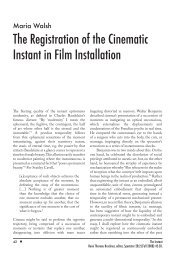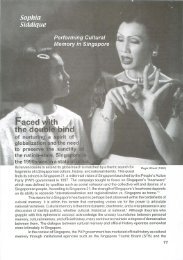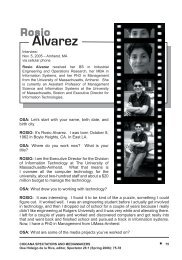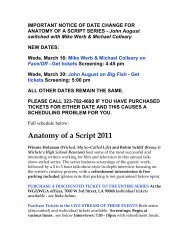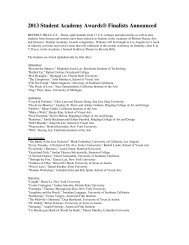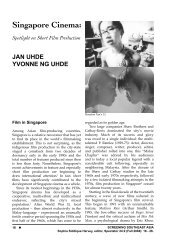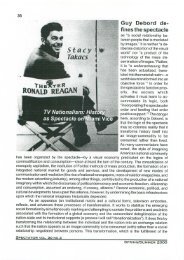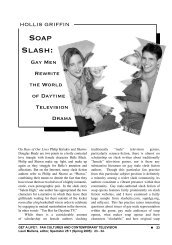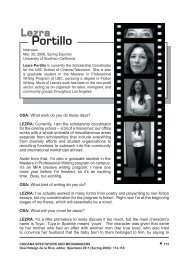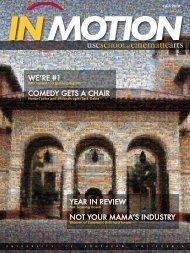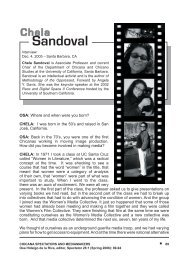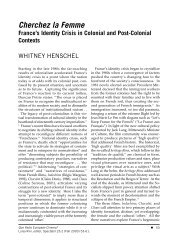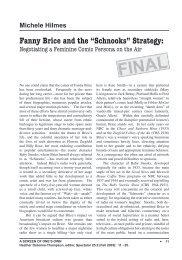IN MOTION (backup) V.3 - USC School of Cinematic Arts - University ...
IN MOTION (backup) V.3 - USC School of Cinematic Arts - University ...
IN MOTION (backup) V.3 - USC School of Cinematic Arts - University ...
You also want an ePaper? Increase the reach of your titles
YUMPU automatically turns print PDFs into web optimized ePapers that Google loves.
Renov Named Associate<br />
Dean for Academic Affairs<br />
By John Zollinger<br />
Pr<strong>of</strong>essor Michael Renov, who has taught critical studies for over 22 years, 18 <strong>of</strong> them at <strong>USC</strong>,<br />
assumed the post <strong>of</strong> associate dean for academic affairs in August. He replaces Pr<strong>of</strong>essor<br />
Richard Jewell, who is returning to teaching after a decade <strong>of</strong> service in the slot.<br />
Renowned at home and abroad for his expertise in the documentary film form, Renov is a prolific<br />
writer who has authored scores <strong>of</strong> articles and written or edited seven books, among them<br />
Hollywood’s Wartime Woman:<br />
Representation and Ideology and The<br />
Subject <strong>of</strong> Documentary, which was released<br />
this year. In addition, he is the co-founder<br />
<strong>of</strong> Visible Evidence, an annual international<br />
documentary studies conference. In conjunction<br />
with the <strong>USC</strong> Casden Institute<br />
for Study <strong>of</strong> the Jewish Role in American<br />
Life, Renov also created “Eye & Thou:<br />
Jewish Autobiography in Film and Video,”<br />
a series <strong>of</strong> events featuring screenings <strong>of</strong><br />
Jewish autobiographical films, followed by<br />
on-stage dialogues between filmmakers and<br />
humanities scholars.<br />
Michael Renov<br />
Q: What exactly does the associate dean for academic affairs do?<br />
Renov holds a Master <strong>of</strong> <strong>Arts</strong> degree from<br />
San Francisco State <strong>University</strong> and a Ph.D.<br />
from UCLA in film and television studies.<br />
Renov: The associate dean for academic affairs is the point person for all faculty concerns, chief among<br />
them promotion and tenure, as well as the vital matter <strong>of</strong> curriculum — the content and coordination <strong>of</strong><br />
all course <strong>of</strong>ferings. The person in this position must also be devoted to the academic vision. Who are we<br />
as a school? We know we’re changing and growing, and we really have to be able to chart the course for<br />
the future. To that end, the associate dean must facilitate open communication among the faculty, help<br />
create consensus around shared goals, and move the <strong>School</strong> forward.<br />
Q: How has the <strong>School</strong> positioned itself to meet the future?<br />
Renov: We’ve just spent the last year putting together a strategic plan for the <strong>School</strong>, which allows us to<br />
look forward five years or so down the road, to see where we are as a school, evaluate ourselves in a very<br />
honest way — assessing our strengths and weaknesses — and project what we want for the future. I<br />
think any dynamic organization, any school, any business has to constantly be engaged in self-evaluation,<br />
and we’ve gone through that process in what seems to be a very effective way.<br />
“We really have to be able to chart<br />
the course for the future.”<br />
Q: What motivated you to take this post?<br />
— Michael Renov<br />
Renov: I came out <strong>of</strong> this strategic-planning year feeling that this was a great moment for the <strong>School</strong><br />
and that I was ready to take a larger role in brainstorming ideas and planning for the future. I’m also eager<br />
to forge connections and create stronger collaborations with other schools and departments on campus.<br />
Q: Do you mean collaborations like the undergraduate minor in gaming that the<br />
Interactive Media Division began this semester with the Viterbi <strong>School</strong> <strong>of</strong> Engineering?<br />
Renov: Exactly. There are many <strong>USC</strong> faculty members who have a lot to <strong>of</strong>fer and to gain from collaborations<br />
with us. We’re perfectly situated to create a greater synergy within our own faculty and with<br />
faculty from other schools. And why not? Why not make <strong>USC</strong> the best place possible when it comes to<br />
media studies and media production?<br />
Q: Stepping back for a moment, what do you think is the <strong>School</strong>’s importance<br />
to society?<br />
Renov: People love to go to the movies, but I don’t think they necessarily make the connection between<br />
going to the movies and solving pressing social problems, when, in fact, popular culture is one <strong>of</strong> the<br />
important ways that any society works through its conflicts, its tensions, its key issues. The <strong>School</strong> is in<br />
an ideal situation because we’ve created a laboratory environment in which we can try out new things,<br />
test our ideas, allow students to fail, encourage all kinds <strong>of</strong> experimentation, and take risks. We’re preparing<br />
the next generation <strong>of</strong> media practitioners — producers, writers, directors, cinematographers, scholars,<br />
animators, game designers. If we can instill values, stimulate critical thinking, and promote collaborations<br />
across various boundaries, encouraging diversity <strong>of</strong> expression and <strong>of</strong> ideas, we’re going to have a<br />
huge social impact. Because we’re developing the next generation, who will help set the cultural agenda<br />
and shape the future.<br />
<strong>School</strong>s in Harmony<br />
Collaboration Hits a High Note<br />
By Margaret M. Dunlap<br />
Although the <strong>School</strong> <strong>of</strong> Cinema-Television and the Thornton<br />
<strong>School</strong> <strong>of</strong> Music stand only a few feet from each other, the<br />
gulf between student directors and student composers has historically<br />
been a difficult one to bridge.<br />
Said Assistant Pr<strong>of</strong>essor David J. Bondelevitch, MPSE, “When I was<br />
a student at <strong>USC</strong>, it struck me as very odd that there was not a class<br />
about film music, which is, to me, one <strong>of</strong> the most important parts<br />
<strong>of</strong> the filmmaking process.” When he returned to the <strong>School</strong> <strong>of</strong><br />
Cinema-Television as a member <strong>of</strong> the sound faculty, he proposed a<br />
solution in the form <strong>of</strong> a new course, one that eventually became<br />
CTPR 437: Directing the Composer. Recently, he also found an ally<br />
at the music school in Pr<strong>of</strong>essor Brian King, a Thornton <strong>School</strong> faculty<br />
member since 1998, and now director and chair <strong>of</strong> the Scoring<br />
for Motion Pictures and Television Program.<br />
Since fall 2002, Bondelevitch and King have hosted meetings each<br />
semester to introduce students in the film and television scoring<br />
program to students directing or producing films. The most recent<br />
convocation in October drew approximately 70 students and resulted<br />
in several successful collaborations. Further strengthening this<br />
program, an endowed chair in music editing has been established at<br />
the <strong>School</strong> <strong>of</strong> Cinema-Television, and renowned music editor Ken<br />
Hall has joined the cinema-television faculty.<br />
King has also partnered with Richard Hyland, sound department<br />
coordinator for the <strong>School</strong> <strong>of</strong> Cinema-Television, to produce “Music<br />
Master Classes” for film and music students on the Spielberg Music<br />
Scoring Stage. Two workshops have been held thus far, one for<br />
string performance and another for percussion.<br />
For King, communication is the key goal. “Film students don’t necessarily<br />
speak the language <strong>of</strong> music. They’ll say, ‘I need a whoosh!<br />
here,’ or ‘I’m looking for something vaporous’, and that doesn’t<br />
always translate.” At the same time, it can take scoring students a<br />
while to develop a cinematic sensibility. “Most <strong>of</strong> the time, they just<br />
write too much music. They learn that they need to leave room<br />
for the silences.”<br />
Brian King (left) <strong>of</strong> the Thornton <strong>School</strong> and David J. Bondelevitch <strong>of</strong><br />
the <strong>School</strong> <strong>of</strong> Cinema-Television are fine-tuning <strong>USC</strong>’s film and television<br />
scoring program.<br />
In spring 2004, Assistant Pr<strong>of</strong>essor David<br />
Bondelevitch, MPSE, and Rob Cutietta, dean <strong>of</strong> the<br />
<strong>USC</strong> Thornton <strong>School</strong> <strong>of</strong> Music, were judges for a unique<br />
scholarship competition. Four graduate students from the<br />
<strong>School</strong> <strong>of</strong> Cinema-Television’s Division <strong>of</strong> Film and<br />
Television Production — William Seth Dalton, Soo Z.<br />
Hugh, Joshua Rous, and Adam Stein — were each awarded<br />
a grant to be used to produce a short film using music<br />
from a soon-to-be-released recording <strong>of</strong> Yo-Yo Ma playing<br />
film composer Ennio Morricone’s music. The four films<br />
will debut at a special concert on November 5, accompanied<br />
live by Ma and the <strong>USC</strong> Thornton Chamber<br />
Orchestra, and conducted by the composer’s son, Andrea<br />
Morricone, in Bovard Auditorium.<br />
fall 2004 in motion | 5




